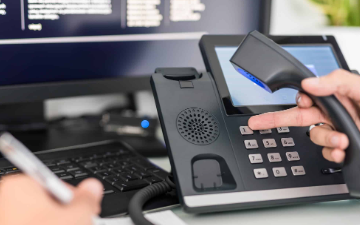The Role of VoIP Solutions in Disaster Recovery Planning

How prepared is your company to handle unexpected disruptions? Companies must be equipped to deal with natural disasters that could disrupt operations. Disaster recovery planning is critical to ensuring business continuity in times of crisis. This is where VoIP( Voice over Internet Protocol) comes into play.
VoIP solutions offer a modern communication method that ensures connectivity despite compromised physical infrastructure. By utilizing advanced communication networks, companies can reduce downtime and ensure smooth. In this article, we will explore the role of VoIP in enhancing disaster recovery efforts.
Ensuring Business Continuity
One of VoIP’s most significant advantages is its ability to ensure business continuity. Traditional phone lines can be vulnerable to damage during disasters, leaving businesses without communication. However, companies can quickly reroute calls to remote devices because VoIP operates over the Internet. Employees can access the system from anywhere, keeping communication lines open during critical moments.
Quick and Easy Call Routing
Quick action is essential in the event of a disaster. VoIP allows for easy call routing to alternative numbers or devices, ensuring no call goes unanswered. Whether routing calls to a backup location or enabling employees, VoIP systems’ flexibility ensures seamless communication. This rapid adaptability makes it an essential tool in any disaster recovery plan, allowing businesses to maintain contact with clients and partners without interruption.
Remote Work Capabilities
During emergencies, it’s common for employees to be unable to access the office. With VoIP, businesses can instantly enable remote work capabilities. Employees can access their phone lines from any internet-enabled device. This mobility ensures that teams can continue collaborating and communicating, regardless of location. VoIP systems help businesses stay agile in crises by supporting a distributed workforce.
Minimizing Downtime with Cloud Solutions
Disaster recovery planning often revolves around minimizing downtime, and VoIP plays a crucial role. Since systems are typically cloud-based, they are not dependent on physical infrastructure. This makes them more resilient during disasters, as operations can continue in the cloud. Cloud communication platforms ensure businesses can quickly recover from disruptions, minimizing costly downtime and running operations smoothly.
Cost-Effective Disaster Recovery Solution
VoIP is also a cost-effective component of disaster recovery planning. Traditional phone systems often require expensive backup hardware and maintenance to ensure continuity during emergencies. In contrast, services are typically more affordable and offer built-in redundancy through cloud hosting. It reduces the need for costly backup infrastructure investments while providing the necessary tools to maintain communication during a disaster.
Improved Dilatability and Flexibility
Dilatability is essential in disaster recovery planning, and VoIP systems excel in this area. Whether your business needs to quickly scale up communication capabilities during an emergency or adapt to reduced staff levels, it allows for easy adjustments. This scalability ensures that your business remains agile and responsive when it matters most. This scalability ensures that your business remains agile and responsive when it matters most.
The Importance of Data Security
Data security is crucial in disaster recovery planning, and VoIP systems provide robust security features. Most providers offer encryption and other security protocols to protect sensitive information during communication. This ensures that your business data remains secure, even during an emergency. By integrating security measures into your disaster recovery plan, VoIP systems help protect against potential cyber threats that could arise during a crisis.
Integrating VoIP solutions into disaster recovery planning is essential for maintaining communication and business continuity during emergencies. Providing remote access and cloud-based resilience allows businesses to stay connected, even in challenging situations. Their cost-effectiveness and security features make them ideal for any company to strengthen its disaster recovery strategy and ensure minimal downtime.




